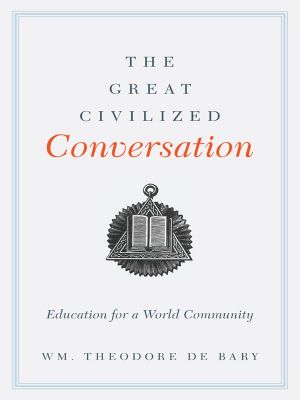The Great Civilized Conversation

- Authors
- Bary, Wm. Theodore de
- Publisher
- Columbia University Press
- Tags
- history , philosophy , lit008010 , education , curricula , literary criticism , asian , chinese , edu007000
- ISBN
- 9780231535106
- Date
- 2013-06-25T00:00:00+00:00
- Size
- 15.29 MB
- Lang
- en
Having spent decades teaching and researching the humanities, Wm. Theodore de Bary is well-positioned to speak on its merits and reform. Believing a classical liberal education is more necessary than ever, he outlines in these essays a plan to update existing core curricula, incorporating classics from both Eastern and Western traditions to bring the philosophy and moral values of Asian civilizations to American students, and vice versa.The author establishes a concrete link between teaching the classics of world civilizations and furthering global humanism. Selecting texts that share many of the same values and educational purposes, he joins Islamic, Indian, Chinese, Japanese, and Western sources into a revised curriculum that privileges humanity and civility. He also explores the tradition of education in China and its reflection of Confucian and Neo-Confucian beliefs. He reflects on historys great scholar-teachers and what their methods can teach us today, and he...
Having spent decades teaching and researching the humanities, Wm. Theodore de Bary is well-positioned to speak on its merits and reform. Believing a classical liberal education is more necessary than ever, he outlines in these essays a plan to update existing core curricula, incorporating classics from both Eastern and Western traditions to bring the philosophy and moral values of Asian civilizations to American students, and vice versa. The author establishes a concrete link between teaching the classics of world civilizations and furthering global humanism. Selecting texts that share many of the same values and educational purposes, he joins Islamic, Indian, Chinese, Japanese, and Western sources into a revised curriculum that privileges humanity and civility. He also explores the tradition of education in China and its reflection of Confucian and Neo-Confucian beliefs. He reflects on history’s great scholar-teachers and what their methods can teach us today, and he dedicates three essays to the power of The Analects of Confucius, The Tale of Genji, and The Pillow Book of Sei Shonagon in the classroom.
Having spent decades teaching and researching the humanities, Wm. Theodore de Bary is well-positioned to speak on its merits and reform. Believing a classical liberal education is more necessary than ever, he outlines in these essays a plan to update existing core curricula, incorporating classics from both Eastern and Western traditions to bring the philosophy and moral values of Asian civilizations to American students, and vice versa.
The author establishes a concrete link between teaching the classics of world civilizations and furthering global humanism. Selecting texts that share many of the same values and educational purposes, he joins Islamic, Indian, Chinese, Japanese, and Western sources into a revised curriculum that privileges humanity and civility. He also explores the tradition of education in China and its reflection of Confucian and Neo-Confucian beliefs. He reflects on history's great scholar-teachers and what their methods can teach us today, and he dedicates three essays to the power of "The Analects of Confucius," "The Tale of Genji," and "The Pillow Book of Sei Shonagon" in the classroom.